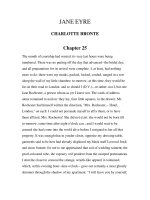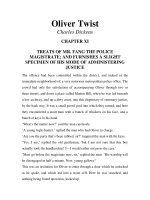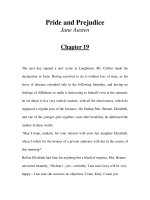LUYỆN ĐỌC TIẾNG ANH QUA TÁC PHẨM VĂN HỌC-Oliver Twist -Charles Dickens -CHAPTER 13
Bạn đang xem bản rút gọn của tài liệu. Xem và tải ngay bản đầy đủ của tài liệu tại đây (32.01 KB, 10 trang )
Oliver Twist
Charles Dickens
CHAPTER XIII
SOME NEW ACQUAINTANCES ARE
INTRODUCED TO THE INTELLIGENT READER,
CONNECTED WITH WHOM VARIOUS PLEASANT
MATTERS ARE RELATED, APPERTAINING TO
THIS HISTORY
’Where’s Oliver?’ said the Jew, rising with a menacing look. ‘Where’s the
boy?’
The young thieves eyed their preceptor as if they were alarmed at his
violence; and looked uneasily at each other. But they made no reply.
’What’s become of the boy?’ said the Jew, seizing the Dodger tightly by the
collar, and threatening him with horrid imprecations. ‘Speak out, or I’ll
throttle you!’
Mr. Fagin looked so very much in earnest, that Charley Bates, who deemed
it prudent in all cases to be on the safe side, and who conceived it by no
means improbable that it might be his turn to be throttled second, dropped
upon his knees, and raised a loud, well-sustained, and continuous roar—
something between a mad bull and a speaking trumpet.
’Will you speak?’ thundered the Jew: shaking the Dodger so much that his
keeping in the big coat at all, seemed perfectly miraculous.
’Why, the traps have got him, and that’s all about it,’ said the Dodger,
sullenly. ‘Come, let go o’ me, will you!’ And, swinging himself, at one jerk,
clean out of the big coat, which he left in the Jew’s hands, the Dodger
snatched up the toasting fork, and made a pass at the merry old gentleman’s
waistcoat; which, if it had taken effect, would have let a little more
merriment out, than could have been easily replaced.
The Jew stepped back in this emergency, with more agility than could have
been anticipated in a man of his apparent decrepitude; and, seizing up the
pot, prepared to hurl it at his assailant’s head. But Charley Bates, at this
moment, calling his attention by a perfectly terrific howl, he suddenly
altered its destination, and flung it full at that young gentleman.
’Why, what the blazes is in the wind now!’ growled a deep voice. ‘Who
pitched that ‘ere at me? It’s well it’s the beer, and not the pot, as hit me, or
I’d have settled somebody. I might have know’d, as nobody but an infernal,
rich, plundering, thundering old Jew could afford to throw away any drink
but water—and not that, unless he done the River Company every quarter.
Wot’s it all about, Fagin? D—me, if my neck-handkercher an’t lined with
beer! Come in, you sneaking warmint; wot are you stopping outside for, as if
you was ashamed of your master! Come in!’
The man who growled out these words, was a stoutly-built fellow of about
five-and-thirty, in a black velveteen coat, very soiled drab breeches, lace-up
half boots, and grey cotton stockings which inclosed a bulky pair of legs,
with large swelling calves;—the kind of legs, which in such costume, always
look in an unfinished and incomplete state without a set of fetters to garnish
them. He had a brown hat on his head, and a dirty belcher handkerchief
round his neck: with the long frayed ends of which he smeared the beer from
his face as he spoke. He disclosed, when he had done so, a broad heavy
countenance with a beard of three days’ growth, and two scowling eyes; one
of which displayed various parti- coloured symptoms of having been
recently damaged by a blow.
’Come in, d’ye hear?’ growled this engaging ruffian.
A white shaggy dog, with his face scratched and torn in twenty different
places, skulked into the room.
’Why didn’t you come in afore?’ said the man. ‘You’re getting too proud to
own me afore company, are you? Lie down!’
This command was accompanied with a kick, which sent the animal to the
other end of the room. He appeared well used to it, however; for he coiled
himself up in a corner very quietly, without uttering a sound, and winking
his very ill-looking eyes twenty times in a minute, appeared to occupy
himself in taking a survey of the apartment.
’What are you up to? Ill-treating the boys, you covetous, avaricious, in-sa-ti-
a-ble old fence?’ said the man, seating himself deliberately. ‘I wonder they
don’t murder you! I would if I was them. If I’d been your ‘prentice, I’d have
done it long ago, and—no, I couldn’t have sold you afterwards, for you’re fit
for nothing but keeping as a curiousity of ugliness in a glass bottle, and I
suppose they don’t blow glass bottles large enough.’
’Hush! hush! Mr. Sikes,’ said the Jew, trembling; ‘don’t speak so loud!’
’None of your mistering,’ replied the ruffian; ‘you always mean mischief
when you come that. You know my name: out with it! I shan’t disgrace it
when the time comes.’
’Well, well, then—Bill Sikes,’ said the Jew, with abject humility. ‘You seem
out of humour, Bill.’
’Perhaps I am,’ replied Sikes; ‘I should think you was rather out of sorts too,
unless you mean as little harm when you throw pewter pots about, as you do
when you blab and—’
’Are you mad?’ said the Jew, catching the man by the sleeve, and pointing
towards the boys.
Mr. Sikes contented himself with tying an imaginary knot under his left ear,
and jerking his head over on the right shoulder; a piece of dumb show which
the Jew appeared to understand perfectly. He then, in cant terms, with which
his whole conversation was plentifully besprinkled, but which would be
quite unintelligible if they were recorded here, demanded a glass of liquor.
’And mind you don’t poison it,’ said Mr. Sikes, laying his hat upon the table.
This was said in jest; but if the speaker could have seen the evil leer with
which the Jew bit his pale lip as he turned round to the cupboard, he might
have thought the caution not wholly unnecessary, or the wish (at all events)
to improve upon the distiller’s ingenuity not very far from the old
gentleman’s merry heart.
After swallowing two of three glasses of spirits, Mr. Sikes condescended to
take some notice of the young gentlemen; which gracious act led to a
conversation, in which the cause and manner of Oliver’s capture were
circumstantially detailed, with such alterations and improvements on the
truth, as to the Dodger appeared most advisable under the circumstances.
’I’m afraid,’ said the Jew, ‘that he may say something which will get us into
trouble.’
’That’s very likely,’ returned Sikes with a malicious grin. ‘You’re blowed
upon, Fagin.’
’And I’m afraid, you see, added the Jew, speaking as if he had not noticed
the interruption; and regarding the other closely as he did so,—’I’m afraid
that, if the game was up with us, it might be up with a good many more, and
that it would come out rather worse for you than it would for me, my dear.’
The man started, and turned round upon the Jew. But the old gentleman’s
shoulders were shrugged up to his ears; and his eyes were vacantly staring
on the opposite wall.
There was a long pause. Every member of the respectable coterie appeared
plunged in his own reflections; not excepting the dog, who by a certain
malicious licking of his lips seemed to be meditating an attack upon the legs
of the first gentleman or lady he might encounter in the streets when he went
out.
’Somebody must find out wot’s been done at the office,’ said Mr. Sikes in a
much lower tone than he had taken since he came in.
The Jew nodded assent.
’If he hasn’t peached, and is committed, there’s no fear till he comes out
again,’ said Mr. Sikes, ‘and then he must be taken care on. You must get
hold of him somehow.’
Again the Jew nodded.
The prudence of this line of action, indeed, was obvious; but, unfortunately,
there was one very strong objection to its being adopted. This was, that the
Dodger, and Charley Bates, and Fagin, and Mr. William Sikes, happened,
one and all, to entertain a violent and deeply- rooted antipathy to going near
a police-office on any ground or pretext whatever.
How long they might have sat and looked at each other, in a state of
uncertainty not the most pleasant of its kind, it is difficult to guess. It is not
necessary to make any guesses on the subject, however; for the sudden
entrance of the two young ladies whom Oliver had seen on a former
occasion, caused the conversation to flow afresh.
’The very thing!’ said the Jew. ‘Bet will go; won’t you, my dear?’
’Wheres?’ inquired the young lady.









